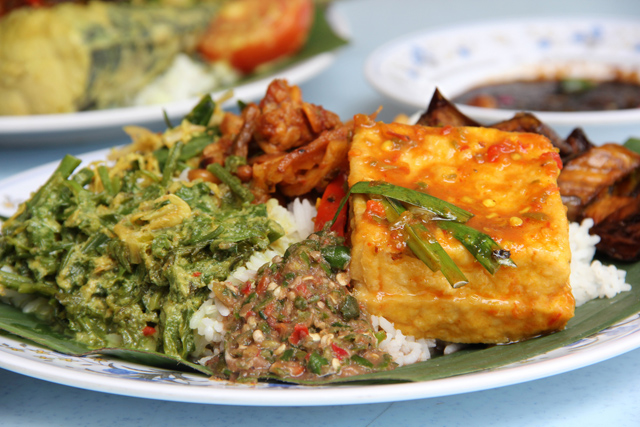 Mark’s Note:
Mark’s Note:
“Eating (and loving) Malaysian food should be a prerequisite for anyone proclaiming to be a gastronome. The holy amalgamations of Malaysian flavors are strengthened, not only by fierce spices but by a group of people that are intensely passionate about their cuisine.
This is a guest post from a gourmet Malaysian herself, Mei of the Cumi & Ciki duo. Their food and travel blog is an inspiring smorgasbord of best Malaysian food eye candy and travel adventures!”
We Malaysians are a lucky lot. Here in our multiracial community, we have exposure to all sorts of cuisine. Chinese, Indian, Malay.. you name it, we have it. Some of these ethnic cooking styles might be blander or less spicy than others, but I have to say that all are equally interesting in their own way. Here are 10 of my own personal favorites, but if I had my way it, it would be 20!
1. Banana Leaf
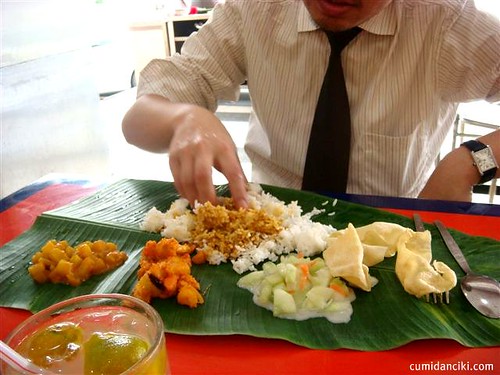
One of the great south Indian cuisines we have the privilege of eating on a daily basis should we chose is, of course, Chettinad cuisine. Chettinad cuisine is the cuisine of the Chettinad region of Tamil Nadu state in South India. If you love rice, you will definitely love the Banana Leaf Rice.
In banana leaf rice, white rice is served on a banana leaf with an assortment of vegetables, curried meat or fish, pickles, and the super addictive papadum ( look like giant, round, flat crisps). Most of the time, however, only the gravy of the curry will be served and no meat is served as it is meant to be a traditional Indian vegetarian dish but since I am no vegetarian, I love mine with mutton rendang and dry chicken curry!
This meal can get really sloppy since it is traditionally eaten with the hand, but most of us have this down to a fine art!
2. Nasi Dagang

Nasi Dagang is another fantastically tasty dish, consisting of rice steamed in coconut milk, fish curry and extra ingredients such as fried shaved coconut, solok lada, hard-boiled eggs, and vegetable pickles.
It is a well-known breakfast food in the states on the East Coast of Peninsular Malaysia, such as Terengganu and Kelantan. The most famous Nasi Dagang of Terengganu comes from a place called Kampung Ladang, an area within the Kuala Terengganu district. I have not tried the one from Kampung Ladang but my colleague who covers the East Coast says it’s truly the best.
3. Bakuteh (BKT)
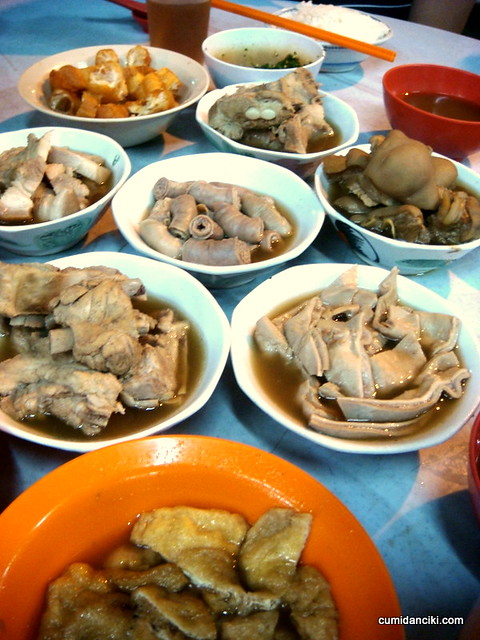
The name literally translates as “meat bone tea”, and, at its simplest, consists of fatty pork ribs simmered in a broth of herbs and spices (including star anise, cinnamon, cloves, dong guai, fennel seeds, and garlic) for as long as possible, i.e. days if possible. However, additional ingredients may include offal, varieties of mushroom, choy sum (vegetables), and pieces tofu puffs.
We personally have the highest regard for BKT at ‘Restaurant Yik See Ho’. This place is situated in the vicinity of the Pudu Wet Market and is a hot favorite amongst KL-lites. Some may beg to differ or have their own favorites but for now, we bring all our friends here. Where else can you see the butchers hacking away at the pig carcass (corner alleyway), in preparation for tomorrow's rations, from where you sit and eat along the 5 footway. Grim? Gross? Well, this is BKT, Pudu style!
4. Hokkien Mee

Fried Hokkien mee (Chinese style- fried yellow noodles) has a cult following in Kuala Lumpur. It is a dish of thick yellow noodles braised in thick dark soy sauce with pork, squid, fish-cake, and cabbage as the main ingredients and cubes of crispy fried pork lard as garnishing (that would be the square cubes that you see on top of the noodle).
Some might say that pork lard is the main ingredient.
This dish is eaten before a huge night out, after a huge night out, for dinner, for supper .. heck, at all hours of the day really. If you have not eaten Hokkien Mee, you have not visited Malaysia, proper!
5. Sang Har noodles

Next up is the Sang Har Kwey Teow (flat noodles). This is fresh river prawns cooked Cantonese style in a thick eggy broth and finished off with either flat or egg noodles. The orange roe in the head of the prawn just seeps and infuses into the eggy liquid sauce of the noodles and makes the taste phenomenal. The amazing way that the tautness of the prawn flesh blends into the springiness of the flat noodles is like these two components were just made for each other.
6. Satay
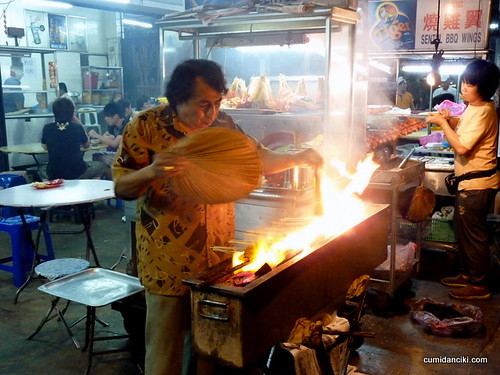
After the Sang Har Mee, we will definitely drag you to eat, the Sentul Satay. Close analogs would be the Yakitori from Japan, the Shish Kebab from Turkey, the Sosatie from South Africa.. oh, and my most recent discovery was the Chuan from China!
Meats on sticks over a BBQ – basic yet effective. Tapping into that childhood ‘fun’ way of eating your food. For satay, the “must-have” ingredient which gives the dish its characteristic yellow color derived from turmeric. Serve it up with a spicy peanut sauce dip, or peanut gravy, slivers of onions and cucumbers, and ketupat (rice cakes).. and you have a balanced meal of carbs, protein, fats, and vegetables but tastes delightfully sinful.. not unlike junk food!
7. Nasi Kandar

If you are a rice lover, this is another amazing local dish that you cannot miss.
Nasi Kandar is a popular northern Malaysian food, which originates from Penang. It is a meal of steamed rice which can be plain or mildly flavored and served with a variety of curries and side dishes. The rice is accompanied by side dishes such as fried chicken, gizzards, curried mutton, cubed beef, fish roe, fried prawns or fried squid. The vegetable dish would usually be brinjal (aubergine), okra/bendi (ladyfingers) or bitter gourd.
A mixture of curry sauces is poured on the rice. Always ask for the sauces to be mixed, i.e. fish + chicken + dhal .. let it soak through your rice and just die from the awesome aroma and taste. This is called nasi ‘banjir’ (flooded rice) and imparts a multifaceted taste to the rice. Many eat the sauced soaked rice with their bare fingers and the aroma actually stays with you long after you have washed your hands. This is part of the appeal of eating Nasi Kandar!
8. Charsiew Rice

CHARSIEW (BBQ Pork) is another great dish. Charlie literally means ‘burn with a fork‘ where long gorgeous fatty strips of seasoned boneless pork are skewered with long forks and placed in a covered oven or over a fire. The meat, typically a shoulder cut is seasoned with a mixture of honey, five-spice powder, fermented tofu, dark soy sauce and possibly hoisin sauce. The melting sugar plus the seasoning will turn the exterior layer of the meat dark red, not dissimilar to American barbecues. A sugar coat is sometimes used in the place of honey to give char siu its characteristic shiny glaze. Here in KL, you can get amazing charities with a texture so soft and succulent in the center, sweet and caramelized on the outside, it would make a grown man weep!
9. Tanjung Tualang Fresh River Prawns
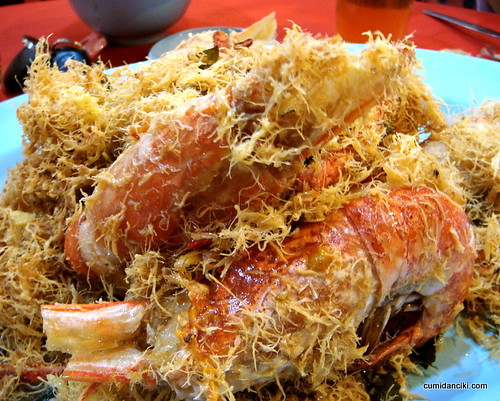
Lung Seng Tanjung Tualang, Perak (North Malaysia) – everybody needs to make this ‘holy’ pilgrimage to the mecca of Fresh River Prawns and all things crustacean at least once in their lifetime. As a matter of fact, KL city folk don’t mind the 2-hour drive to Tanjung Tualang in Perak just to satisfy their yearning for delicious freshwater prawns. They don’t come fresher than this (swimming outside in tanks) and the cooks actually drop them into ice water for five minutes to stun them before they prepare them for cooking. This retains the springy texture and flavor of the meat. Butter River Prawns. Mouth-watering!
10. Nasi Lemak
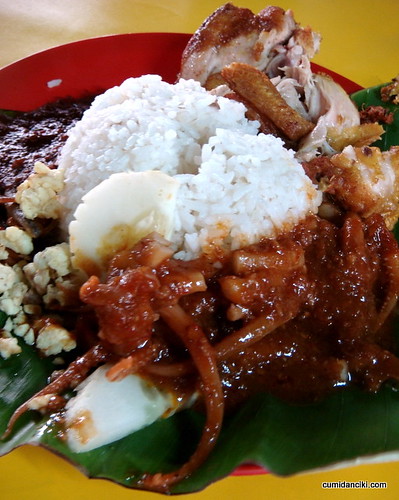
Nasi Lemak is a must! The name itself ” rice in cream” is derived from the cooking process where regular white rice is literally soaked in coconut cream and then steamed to give a gorgeous, aroma of coconut-perfumed white rice that is then wrapped in banana leaf or served on a plate and eaten with the other side dishes mentioned above. Sometimes a knotted pandan leaf, or ginger or a stalk of lemongrass is thrown it to make the rice all the more fragrant.
The Malaysian nasi lemak consists of a hot spicy sauce (sambal), hard-boiled egg, cucumber slices, small dried anchovies (Ikan Bilis) and roasted peanuts at its core and to this, you may add sambal cuttlefish, fried chicken, cockle, stir-fried water convolvulus (kangkong), pickled vegetables (achar) or beef rendang (beef stewed in coconut milk and spices).

No comments:
Post a Comment